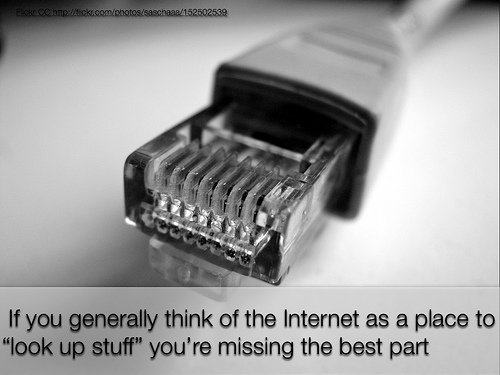
In its unique way, Twitter has commented on American history being made today. Never let it be said that Twitter is unable to convey anything more than little snippets of trivia devoid of any substance. The picture built up in the Twitter stream today as Obama’s victory became clearer and clearer was nothing short of emotional. The brief, fast-flowing tweets created a moving picture of people’s reactions to the historic event.
These are only some of the comments that I’ve selected. Remember, the most recent tweets are first, so you’re reading backwards in time. Kind of cool actually. Here goes:
wow – amazing – i’ve woken up in a better world – my only slight concern… what the hell is michael moore going to make films about now?
well done america 🙂 🙂 🙂
asked Yr 2 boy my reason for making him watch news – he said because it’s the first time a “brown person” has been elected president
Obama thanked me by text message. Wow, he looked pretty busy at the time
‘nite twitter. Welcome to Obamanation. The world approves, btw…
I have always been grateful to be American and I served it with my head held high… I have never been this proud
Analysis of Obama’s speech ( http://tinyurl.com/6xlvkl )
It’s been a long time coming, as the man says ♫ http://blip.fm/~ni0i
Balancing my delight in humanity with the grimness of Fox News pro-life, white supremacist babbling http://icanhaz.com/grim
Bless Obama and the people of the US
I may be a Canadian I am blown away by the history I have just observed. Very moving
awesome speech; told my kids that (let them stay up to hear it), both lass and lad noticed
“He talked of having to housebreak the puppy, they’re gunna also have to housebreak that new democratic majority in the congress”-Tom Brokaw
Oh, the place is vibrating
I like this image of Obama leaving the stage – a single man, walking to meet his wife, going off to meet destiny. Hard to hold back tears
I bet there’s a lady in Alaska who just fired HER personal stylist
We have a White House that looks like our country. Look at that stage, kids all over America are reimagining their world.
The last time I saw this much emotion on TV was death of Elvis when I was about 5 or 6. Better this time around
God, the image of the racial, national, and generational mix hugging on the stage in Chicago is a book in itself. History, history, history
Seeing all of the kids together is so cool!!!
Okay, I don’t think I’ve ever cried at a politician’s speech before in my life. Still kind of afraid to hope. But I think I’ll try
I like the sense of marital harmony I get from B and M. They really seem a pair that likes each other, a team. And those kids are fresh air
is it my imagination or did everyone stop tweeting during that speech?
Officially crying tears of joy
“if our children live to see the next century ..what progress we will have made? Open opportunities for our kids – peace. yes we can”
I am crying. Just from my right eye. Obama is great
He’s going to close with the speech we need
v v excited about Obama winning – maybe humans do have some ability to restore balance
Sitting in family room watching Obama’s speech. Wife and daughters waving American Flags at each pause. Great night!
“Our story is singular but our destiny is shared. A new dawn of American leadership is at hand.”
I gotta remember to buy different newspapers and magazines tomorrow to put in my daughter’s memory box
Okay, seriously… “the new puppy that is coming with us to the White House?” That absolutely made me laugh with delight.
holy wow… can that man speak.
Obama takes the stage! What a night!
anyone else terrified about what Those Who Hate Obama might attempt to do once he’s president, or before? I can’t shake it from my mind…
From another student — “I feel as if I can really do anything in the world now. Like for real.”
Just got a text from one of my advisees that made me cry, “Lehmann!!! We did it! President Obama!” This election really was about hope.
goodnight, tweeps. Pray for this nation, now more than ever.
Oh hurrah! My American friends have just texted me the news!!! Good old America, good old Americans! Xxx
Wow McCain’s speech was amazing. That was the McCain that should have been showing more during the campaign
well done to the people of America (and Obama), congratulations are in order. change is a necessity and a good thing
Magnanimous concession by John McCain. Well done.
There are moments in life that are too big to grasp. This is one of those moments. In total blissful shock. Too shocked to even cry… yet
Congratulations America!
Woo hoo! Just saw that Obama has won the election! I’m crying! Tears of joy 🙂
History in the making. . was this the first presidency tweeted through? Will Obama be known for changes in technology?
wow, nyc is going crazy, so loud outside.
“Don’t deny it, Obama is all Web 2.0” – http://is.gd/6n9j
When I watched his speech at the DNC 4 years ago, I thought “He could seriously be president.” Never thought it’d be in 2008.
“This is something so much bigger than Senator Obama”
nice to see my friends cheering too… yay twitter. hi dudes. i love loving america this morning.
McCain conceded via phone
Huzzah!
I am so proud of us right now…
wow. I don’t believe it. I just don’t believe it. WOW!!!!!!!!!!!!!!!!!!!!!!!!!!!!!!!!!!
O.M.F.G. Thank you America. You have made me extremely proud. Thank YOU!
Playing “Signed, Sealed and Delivered,” with all of the American flags waving is really moving
So happy to call Obama my PRESIDENT!
Congrats to President Obama! So much for going to sleep, gotta see his speech now!
Congratulations to my US friends – looks like you just got yourself a President
Hopes and Dreams!
gotta go hug my wife!
I can’t imagine being in the room with Barack when he got the word about becoming the next president……amazing time…..
Wow! This is exciting!
Fox just called it for Obama. That’s about as done as it gets. Congratulations President Obama! Please fix our country soon!
Obama. It’s over.
ABC News declares Obama the next President of the United States
I just got chills………..
CNN just called it
CNN calls it. Obama is the 44th President of the US
called. Omg
It’s all over!!!!!!!!




